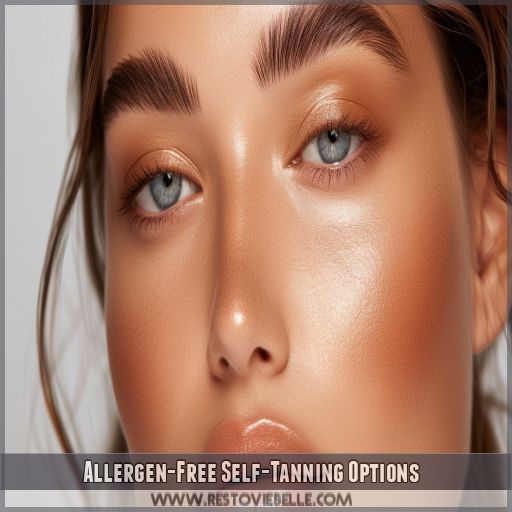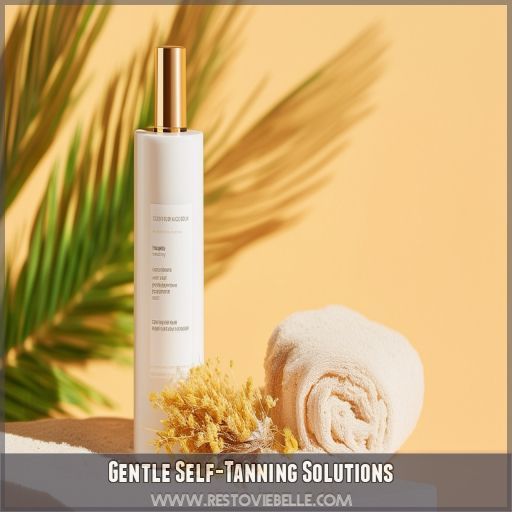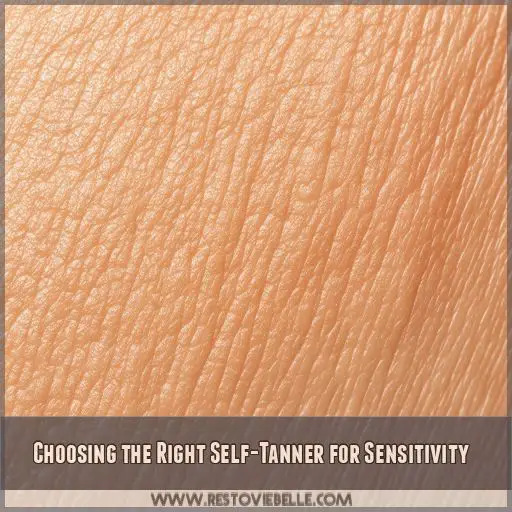This site is supported by our readers. We may earn a commission, at no cost to you, if you purchase through links.
 Finding the best self-tanner for sensitive skin can be a real pain. You want that sun-kissed glow, minus the irritation and allergic reactions that come with it, right?
Finding the best self-tanner for sensitive skin can be a real pain. You want that sun-kissed glow, minus the irritation and allergic reactions that come with it, right?
Through our research and testing of top products, we give you gentle allergy-free formulas that really perform. From hypoallergenic formulas to easy-application solutions, let us show you how to choose the right self-tanner for hypersensitive skin.
Learn how to achieve that radiant, smudge-free tan while at the same time keeping your skin happy and healthy.
Let’s take a closer look at the top picks for secure, beautiful bronzes.
Table Of Contents
- Key Takeaways
- Best Hypoallergenic Self-Tanner
- Top Pick for Sensitive Skin
- Easy Application for Sensitized Skin
- Allergen-Free Self-Tanning Options
- Gentle Self-Tanning Solutions
- Choosing the Right Self-Tanner for Sensitivity
- Frequently Asked Questions (FAQs)
- Is there a hypoallergenic self-tanner?
- What is the number one best self-tanner?
- What is the best and easiest self tan?
- What am I allergic to in self-tanners?
- How long does self-tanner last on sensitive skin?
- Can I use self-tanner if I have eczema?
- Are there natural alternatives to DHA for sensitive skin?
- How often should I reapply self-tanner on sensitive skin?
- Can medications affect self-tanner results on sensitive skin?
- Conclusion
Key Takeaways
- Hypoallergenic formulas are your new BFFs! Look for fragrance-free options with soothing ingredients like aloe vera and coconut oil. Your sensitive skin will thank you later.
- Patch test like your life depends on it (because your glow-up kinda does). Slap a bit on your inner arm and wait 24 hours. If there’s no angry red rebellion, you’re good to go!
- Moisture is the name of the game. Keep your skin hydrated like it’s stuck in the Sahara, and your tan will not only look better but last longer too. Win-win!
- Don’t be afraid to DIY. Mixing a few drops of self-tanner into your favorite moisturizer gives you control over your glow. It’s like being the wizard of Oz, but for tanning!
Best Hypoallergenic Self-Tanner
When one has sensitive skin, finding a good hypoallergenic self-tanner really makes all the difference. You’re looking for fragrance-free and allergy-friendly products that won’t trigger irritation.
Dermatologically-approved formulas are your best friends—they’re designed with soothing and protecting skin-calming ingredients. Non-toxic natural self-tanners fast gain preference due to their gentle approach.
Hypoallergenic products may still cause reactions, so remember testing first.
Just use a self-tanner that’s gentle on sensitive skin, and you’ll be all set for a golden glow without redness or discomfort.
Top Pick for Sensitive Skin
For sensitive skin, our top pick is outstanding with a gentle and allergy-free formula. This self-tanner offers:
Buildable coverage for a customized glow.
- Quick-dry formula helps reduce irritation
- Long-lasting results without harsh chemicals
You’ll love this affordable, cruelty-free option, catering to all your sensitive skin needs, designed to give you a natural-looking tan without flare-ups. Obvi, always patch test—even with gentle formulas. And, well, there you have it—safely and comfortably on your way to that sun-kissed look, no matter how sensitive your skin is, with this top pick.
Easy Application for Sensitized Skin
Now that you’ve found your perfect sensitive-skin-friendly self-tanner, let’s talk application. You’ll want to master the art of easy application to avoid irritation and achieve that flawless glow. Here are some key tips for a smooth, streak-free tan:
| Application Method | Benefits | Best For |
|---|---|---|
| Gradual Coverage | Builds color slowly | Beginners |
| Self Tanner Drops | Customizable intensity | Experienced users |
| Fragrance-Free Mousse | Easy to blend | All skin types |
Allergen-Free Self-Tanning Options
If you have sensitive skin, then you should look for allergen-free self-tanning products. Normally, such hypoallergenic formulas are infused with natural extracts and moisturizers that will provide your skin with additional nourishment during the production of a sunless tan in a very gentle way.
Look for non-irritating ingredients like aloe vera or coconut oil, which work to soothe and hydrate your skin. Many brands are coming out with allergen-free self-tanners now, and they do a lovely job of putting the user in a soft glow, sans irritation.
Gentle Self-Tanning Solutions
From fragrance-free formulas that keep those dreaded reactions at bay to gentle, natural alternatives of DHA obtained from sugar beets, these magic solutions could work wonders when paired with soothing aloe and hydrating hyaluronic acid.
Never shun a DIY approach: mix some drops of self-tanner into your favorite moisturizer and take control.
For fade-resistant results, look out for gradual tan products enriched with vitamins C and E.
These gentle approaches make sure that sensitive skin is happy while you rock that sun-kissed look.
Choosing the Right Self-Tanner for Sensitivity
When choosing a self-tanner for sensitive skin, focus on products with gentle, hypoallergenic ingredients that won’t irritate your skin. Always perform a patch test before full application and opt for formulas that offer hydration, as moisturized skin tends to react better to self-tanning products.
Gentle Ingredients Matter
When choosing a self-tanner for sensitive skin, gentle ingredients are crucial. Look for formulas that are:
- Hypoallergenic
- Free from harsh chemicals
- Plant-based
- Cruelty-Free
Less irritation, but that highly coveted glow. What’s more, the best self-tanner for sensitive skin will have a clean and really simple formula. Go for products containing some of these skin-loving ingredients: aloe vera, coconut water, and hyaluronic acid for both nourishing your skin while it’s tanning and after.
Patch Test First
While gentle ingredients are the key, don’t skip out on patch testing. You have to apply a small amount of self-tanner on your inner arm and leave it for 24 hours. Observe any redness, itchiness, or irritation.
This simple step will safeguard you from further allergic reactions. Try other options if your skin happens to react to it, or adjust the application frequency.
Finding the best self-tanner for sensitive skin is all about trial and error.
Hydration Is Key
After patch testing, focus on hydration. Dry skin needs that extra bit of TLC for even application and to avoid any irritation. Use a moisturizer every day with soothing ingredients like coconut oil or shea butter.
Look out for self-tanners with hydrating ingredients that work well on all skin types, particularly fair to medium tones.
This extra moisture won’t only keep your skin happy but also help your tan last longer and look more natural.
Frequently Asked Questions (FAQs)
Is there a hypoallergenic self-tanner?
Did you know 60% of people have sensitive skin? You’ll find hypoallergenic self-tanners available. They’re formulated without common irritants, using gentle ingredients. Look for products labeled "fragrance-free" and "for sensitive skin" to reduce the risk of reactions.
What is the number one best self-tanner?
You’ll love St. Tropez Self Tan Classic Bronzing Mousse. It’s easy to apply, dries quickly, and gives you a natural-looking tan. It’s streak-free, long-lasting, and works well for most skin types, including sensitive skin.
What is the best and easiest self tan?
You’ll love Bondi Sands Pure Self Tan Foaming Water. It’s easy to apply, dries quickly, and gives a natural-looking glow. It’s fragrance-free and perfect for sensitive skin. Just apply with a mitt for streak-free results.
What am I allergic to in self-tanners?
Self-tanners can be like hidden minefields for allergens. You might just be allergic to fragrances, preservatives, or DHA—so important to patch test and go for fragrance-free, hypoallergenic formulas. Your skin is so unique that what works for others just won’t do for you.
How long does self-tanner last on sensitive skin?
You’ll typically wear your self-tanner on sensitive skin for 5-7 days. _Moisturize daily. Don’t exfoliate if you want it to stay longer. Keep in mind that everyone’s skin is different, as with most things.
Can I use self-tanner if I have eczema?
Did you know 6% of adults with eczema use self-tanners? You can use self-tanner with eczema, but choose fragrance-free, hypoallergenic options. Patch test first, moisturize well, and avoid applying to inflamed areas for safer tanning results.
Are there natural alternatives to DHA for sensitive skin?
You may want to use milder natural alternatives like henna, walnut extract, or carrot juice. Though they don’t last on skin as much as DHA does, they’re certainly mild on sensitive skin. Always patch test first to see that your skin tolerates them well.
How often should I reapply self-tanner on sensitive skin?
You should reapply self-tanner on sensitive skin every 5-7 days. It’s best to start with a light application and gradually build up your tan. Always moisturize daily to maintain an even, long-lasting glow.
Can medications affect self-tanner results on sensitive skin?
Medications can turn your self-tanner dreams into a nightmare! They may affect skin sensitivity, dryness, or pigmentation. You’ll want to consult your doctor before applying self-tanner, especially if you’re on antibiotics or acne treatments.
Conclusion
Just as a delicate flower requires special care, so does sensitive skin when it comes to self-tanning. You’re now empowered with the tools necessary to pick the best self-tanner for your sensitive skin by being gentle with the ingredients and testing for allergic reactions prior to using any new products—keeping your skin well-hydrated.
Whether with hypoallergenic formulas or easy applications, no matter which one a user chooses, somewhere out there’s the right solution. With these tips and top picks, you’ll be glowing sans the damage.
Love that sun-kissed glow, bold and allergy-free.












